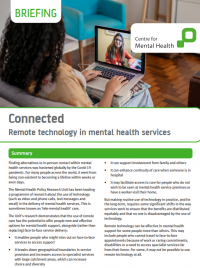Remote technology in mental health services
The use of digital or remote care has rapidly expanded as a result of the pandemic, becoming a lifeline for many people around the world. But making routine, long-term use of technology requires some significant shifts in the way mental health services work to ensure that the benefits are distributed equitably and that no one is disadvantaged by the use of technology.
As part of the NIHR Mental Health Policy Research Unit, we’ve produced a briefing which summarises evidence from six studies on the use of digital and telephone technology to deliver mental health services. Connected: Remote technology in mental health services finds that using remote technology can improve access to mental health support for rural communities, disabled people or people needing a specialist service far from home. It has the potential to increase access and choice in mental health care. But it also risks exacerbating inequalities for people who are digitally excluded.
The briefing highlights the risk of digital mental health support being offered instead of face-to-face support, or being seen as a ‘cheaper alternative’ at a time of pressures on NHS spending. It says that a person’s choice over how they want to access care should be paramount, and that the use of remote care should not make it even harder for people to access face-to-face support.
Connected calls for mental health service commissioners and providers to address digital poverty and exclusion in the use of remote care, and to provide sufficient investment so that remote care is safe and regulated. It also underlines the importance of giving people with mental health difficulties a meaningful choice over the way in which they access mental health support that works for them.





